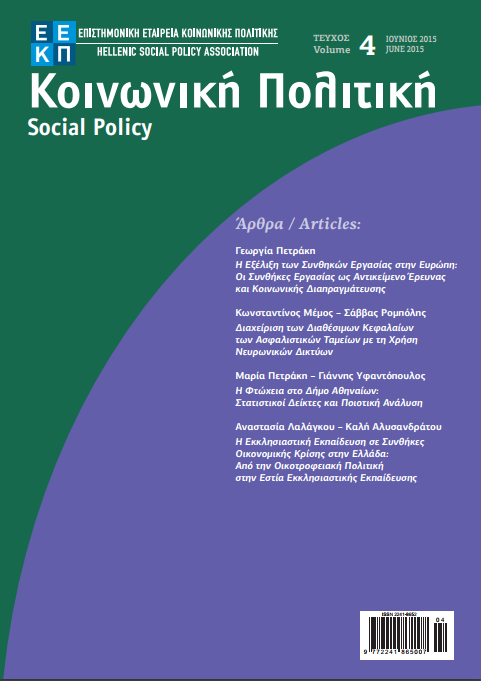Η Φτώχεια στο Δήμο Αθηναίων: Στατιστικοί Δείκτες και Ποιοτική Ανάλυση

Abstract
This article examines the social and economic factors affecting the risk of poverty in theMunicipalityofAthens. We used data from the sample survey conducted at the second half of 2012 to a random sample of 800 households.
The research questions are as follows: What is the extent and depth of poverty in Athens municipality? Which are the risk groups? Who are the most affected by the crisis? Are there any differences between poverty rate in Athens municipality and the total population in Greece?
The data analysis is based on simple and complex distributions as well as relative quantitative indicators and qualitative analyses. In particular, it reveals that the risk of poverty in Athens is high, but lower than that of the whole country (2013: 23.1%).
As social expenditure are limited because of the crisis, the survey demonstrates that targeted policies at the local level are necessary to relief groups below the poverty line and those affected by the economic downturn.
Article Details
- How to Cite
-
Πετράκη Μ., & Υφαντόπουλος Γ. (2017). Η Φτώχεια στο Δήμο Αθηναίων: Στατιστικοί Δείκτες και Ποιοτική Ανάλυση. Social Policy, 4, 28–57. https://doi.org/10.12681/sp.10596
- Issue
- Vol. 4 (2015)
- Section
- Articles

This work is licensed under a Creative Commons Attribution 4.0 International License.
Authors who publish with this journal agree to the following terms:
Authors retain copyright and grant the journal right of first publication with the work simultaneously licensed under a Creative Commons Attribution Non-Commercial License that allows others to share the work with an acknowledgement of the work's authorship and initial publication in this journal.
Authors are able to enter into separate, additional contractual arrangements for the non-exclusive distribution of the journal's published version of the work (e.g. post it to an institutional repository or publish it in a book), with an acknowledgement of its initial publication in this journal.
Authors are permitted and encouraged to post their work online (preferably in institutional repositories or on their website) prior to and during the submission process, as it can lead to productive exchanges, as well as earlier and greater citation of published work.


